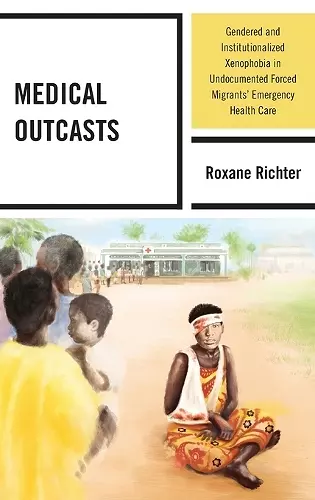Medical Outcasts
Gendered and Institutionalized Xenophobia in Undocumented Forced Migrants' Emergency Health Care
Format:Hardback
Publisher:Bloomsbury Publishing PLC
Published:24th Dec '15
Currently unavailable, and unfortunately no date known when it will be back

As witnessed through the firsthand experiences of a frontline activist and international medical aid practitioner, this biosocial political study gives voice to the inequities in undocumented Mexican and Zimbabwean women’s emergency healthcare access and treatment in Houston, United States of America, and Johannesburg, South Africa. As a construct of feminist transdisciplinary fieldwork, this research utilizes methodological pluralism and biosocial disparities to examine constructs of “social determinants” or “social origins” of women’s suffering, disease, and healthcare access. These variables include gender inequity, xenophobia, structural violence, political economy subjugation, healthcare access and delivery disparities, and human rights violations.
Illustrated through 24 purposive interviews, this seven-year study shows Zimbabwean women sought out emergency care at a rate 16 times higher than their Mexican counterparts—but reported lower instances of domestic violence and depression. Most notably, the Zimbabwean women reported communicable diseases at double the rate of the interviewed Latinas. However, the most surprising finding of the study was the high number of Mexican women, some 60%, who cited depression as one of their indications for seeking emergency healthcare.
The study indicated that the reality of many forced migrants’ experiences in claiming their accorded healthcare rights was more theoretical than practical in its distribution and disposition. Particularly, sovereign freedom and civil justice were not being conferred to these women according to the two host country’s mandated Constitutional precepts, and/or emergency medical aid mandates, and social, gender, aid, and human rights justice directives. Thus the role of government in shaping these systemic and institutionalized ideologies will be examined, as well as paradigms that effect national healthcare expenditures, subsidies, and public health risks. The intention of this study is not to provide definitive recommendations of specific forced migration policies that have a civic and/or partisan duty to be executed, but rather to serve as an illustration of how these social tenets, inequitable power relations, and political economy subjugation directly impact socioeconomically disadvantaged women’s health, livelihood, and human rights.
Medical Outcasts is much more than a comparative case study of the need for emergency medical services by Mexican women in the U.S. and Zimbabwean women in South Africa—all immigrants without legal status. Roxane Richter’s research raises profound question of gender inequity, human rights, global ethics and the survival of communities forced to move by natural or human-generated disasters. -- William P. Brandon, Emeritus Metrolina Medical Foundation Distinguished Professor of Health Policy, University of North Carolina Charlotte
This study brings together the treatment of Mexican and Zimbabwean undocumented women refugees in the United States and South Africa respectively. Roxane Richter’s Medical Outcasts sheds new light on the effects of democratic, ethical and human rights deficits for gender equality and refugees in emergency medical services in both countries. -- Sheila Meintjes, University of the Witwatersrand
This book is a timely transdisciplinary research on migrations and the resulting vulnerabilities people, especially women, face when it is complicated by lack of access to health care in the new countries. Richter convincingly demonstrates these challenges through research carried on the experiences of Zimbabwean women in Johannesburg and Mexican women in Houston. This study is a major contribution to global health studies. -- Elias Kifon Bongmba, Harry and Hazel Chavanne Chair in Christian Theology, professor of religious studies, Rice University ; president of the African Association for the Study of Religion
ISBN: 9781498525442
Dimensions: 238mm x 157mm x 22mm
Weight: 485g
232 pages